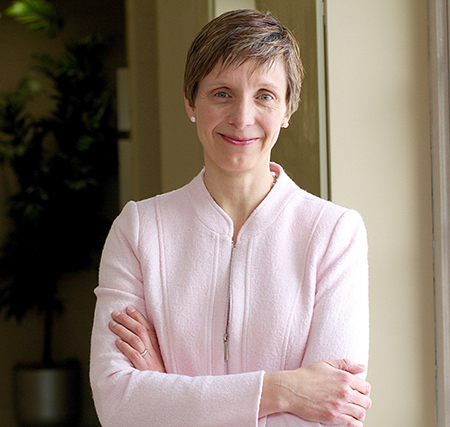Law professor builds on special court’s legacy
January 20, 2017
 Paul Mayne // Western News
Paul Mayne // Western News
The world will have a clearer understanding of sexual and gender-based violence in Sierra Leone during its armed conflict, and, in turn, a blueprint for better prosecuting these war crimes, thanks to the backing of a United Nations (UN) grant and the efforts of a Western Law professor.
As a lawyer with Department of Foreign Affairs in 2000, Valerie Oosterveld and a colleague led Canada’s role in establishing the Special Court for Sierra Leone, an international criminal tribunal created in 2002 by the UN and the Government of Sierra Leone to address crimes committed during the brutal armed conflict in the West African country in the 1990s. During its decade-long run, ending in 2013, the court indicted numerous individuals on dozens of charges.
Among them was former Liberian President Charles Taylor, the first African head of state convicted for his part in war crimes. Taylor was charged with 11 counts of war crimes, crimes against humanity and other serious violations of international humanitarian law, including murder, forced labour and slavery, recruiting child soldiers and rape. He is currently serving a 50-year sentence.
Oosterveld’s involvement with the court continued until 2005, when she arrived at the Faculty of Law at Western, turning an academic spotlight to the actions of international criminal courts. Today, she is leading a team to draw lessons specifically from the prosecution of sexual and gender-based violence during the duration of the Special Court.
“From the very beginning, the prosecutor of the Special Court decided it would be very gender sensitive – a very big difference from all of the previous international criminal tribunals, such as Rwanda and Yugoslavia,” Oosterveld said.
“In thinking about the crimes that happened in Sierra Leone, the prosecutor realized the sexual and gender-based violence was very central to what happened there. There were thousands upon thousands of women and girls who were captured and basically made into slaves. Part of that was being a sex slave. It’s happened in other conflicts, but it had never been focused upon. The Special Court made it a central purpose of their prosecutions.”
While Oosterveld has written extensively on the judgements and convictions of forced marriage, sexual slavery and rape that came out of the Special Court, no one has truly “pulled back the curtain” to look at how it happened.
To do just that, the UN Entity for Gender Equality and the Empowerment of Women awarded Oosterveld a $37,000 grant. For the project, researchers will interview a range of people – including former court investigators, prosecutors, defence counsel, judges, legal officers and civil society members – to discover the decisions they made, and the actions they took, with respect to these crimes.
Oosterveld is working with former Western Law alumna Fanny Leveau, LLB ’11, an expert in gender-sensitive international justice, and Wayne Jordash, a British lawyer with more than 20 years of experience in the international human rights and humanitarian law fields, and a former defence counsel to the Special Court. They will publish their findings as a book and series of articles, in order to disseminate the information to other international and domestic tribunals tasked with gender-related prosecutions of war-time crimes.
“I feel it was a success,” said Oosterveld, looking back at what was accomplished through the Special Court. “What it did, on sexual and gender-based violence, was actually prompt a discussion in Sierra Leone that what happened to these women and girls were crimes. It led to significant law reform – now rape is a crime, where before, it wasn’t a crime unless it was against a young girl. Rape was not a crime in marriage during the conflict.
“Not to say the entire culture has changed – there is still discrimination against women in certain sectors, still a massive problem with rape – but there are prosecutions happening. While there are criminal laws changing, you need the culture change to allow it.”
Oosterveld’s work involves constantly reading transcripts of witness evidence involving what happened to the victims; it can be quite devastating, she said. But she tries to focus on the positive as to why she is reading the transcripts – to make change and ensure there are more gender-sensitive prosecutions happening in the future.
“There has been a radical shift in the understanding of the fact sexual and gender-based violence occurs in most conflicts and needs to be investigated alongside killings, genocide, enslavement and other crimes,” she said. “Part of that radical change is understanding they need to dig deeper and once they do they will discover more violations happening and the International Criminal Court is making progress around this.”






